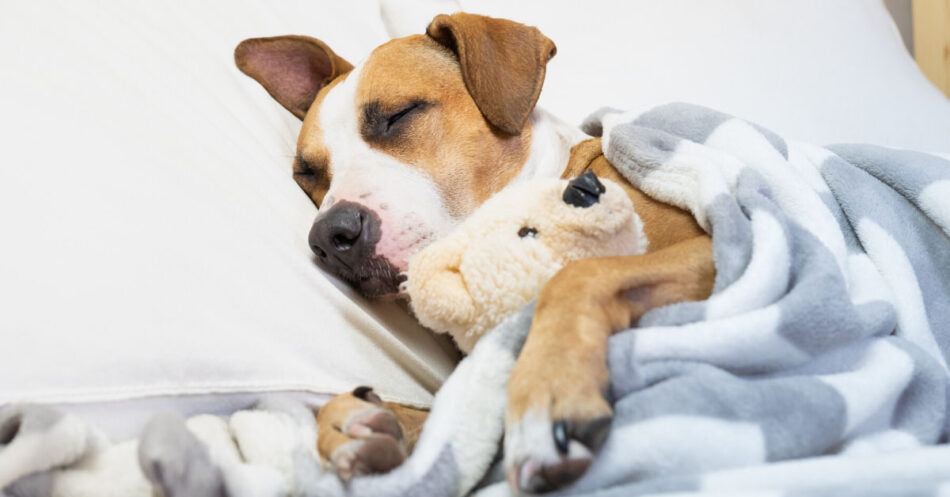
5 Helpful Tips on How to Calm a Restless Dog at Night
This post may include affiliate links. Please read my disclosure policy.
Many dogs come alive when the lights go down. They might get the “zoomies,” or they may simply pace or want to play. Aside from separation anxiety, nighttime anxiety can be one of your canine care hurdles. This isn’t great news for us pet parents who are ready to turn in for the night.
Why Your Dog Is Restless at Night
Below are some reasons why your pup may be having difficulty sleeping or settling down for the night.
- Lack of exercise or mental stimulation. A dog with pent-up energy is like a kettle ready to whistle! If they haven’t had enough exercise during the day, they’re ready to party all night.
- Anxiety or stress. Changes in the environment, a new family member, or even thunderstorms can make your dog restless. All forms of anxiety, whether it’s senior dog anxiety or separation anxiety, can affect your dog’s life in more ways than just their sleep, so consult your veterinarian on how to handle canine anxiety.
- Medical issues. Just like us, dogs can suffer from certain ailments and chronic pain that make getting comfortable a tricky task. An example is diabetes, as the need to urinate frequently can make it difficult for your pup to relax and sleep. Another possible disease that’ll make your pup restless at night is canine cognitive dysfunction, a disease that affects a senior dog’s brain.
- Diet. Restlessness can be caused by an upset stomach due to dietary indiscretion or eating something they shouldn’t, like garbage or table scraps. Food change can also cause digestive problems, which is why the transition should be done gradually over one to two weeks.
- Lack of routine. Dogs, like kids, thrive on routine. A chaotic schedule can throw their internal clock off balance and disrupt their sleep patterns.
Understanding what’s keeping your dog awake at night can be as easy as pie once you know what to look for. Howling or whining at night is quite common for anxious furry friends, especially for younger dogs. Our little pups may be adjusting to their new environment as they just recently separated from their moms. Other signs of restlessness may include pacing back and forth, whining or barking, and constantly changing sleeping positions.
How to Calm Down a Dog Before Bedtime
Helping your dog wind down for bedtime doesn’t have to be a tough task. With a few simple tricks, you can create an atmosphere that soothes your pup and sets the stage for a good night’s rest.
Step 1: Calm Them with Together Time
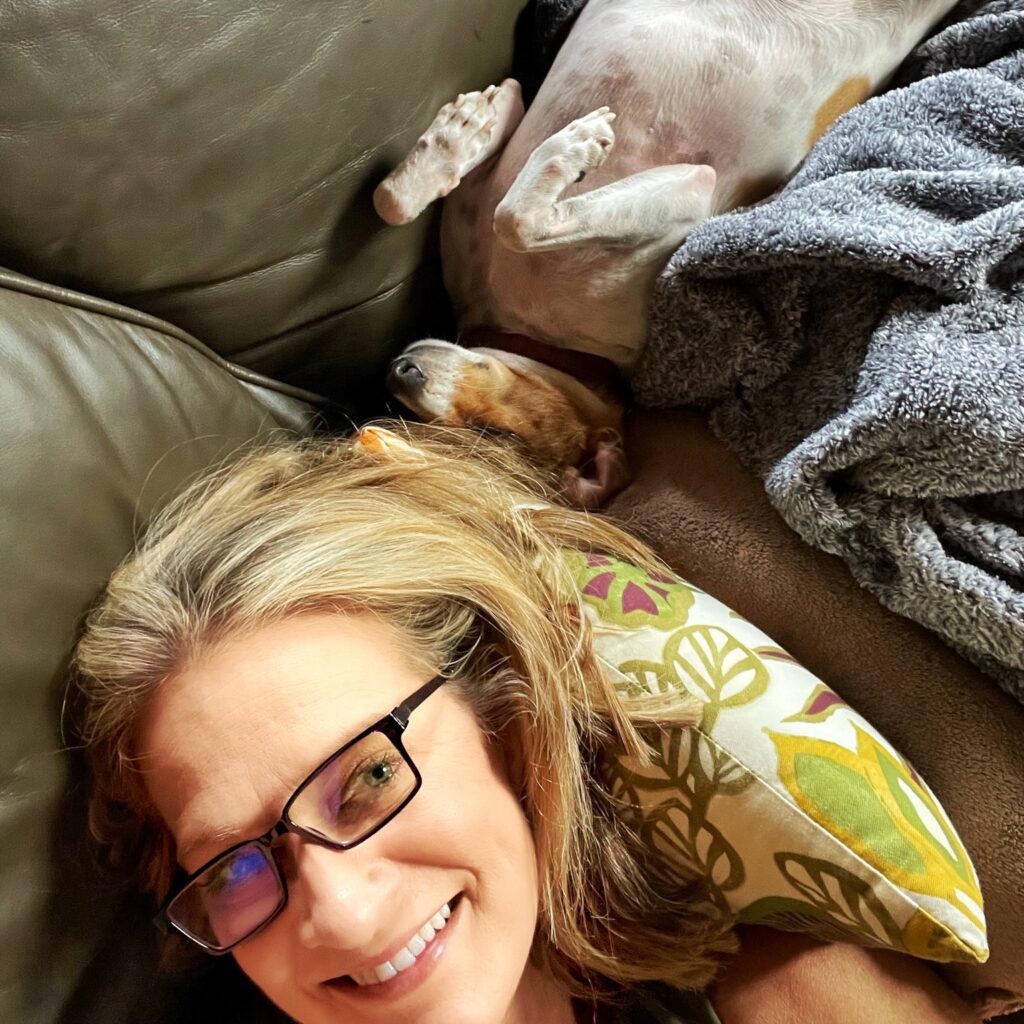
Dedicating time each evening to help your dog unwind will play a crucial role in their ability to relax before bedtime. It’s a great opportunity for both of you to unwind after a busy day.
Initially, you might engage in light play, such as a gentle chase around the house or a game of tug-of-war, but be sure to avoid vigorous activities as bedtime approaches since this can inadvertently boost their energy levels.
As your evening progresses, observe your dog’s cues indicating they’re beginning to tire—this could be pausing more often or taking a drink of water. At this point, transition to more serene activities that you both enjoy, such as snuggling, gently stroking their coat, or providing a soothing ear rub. These quiet moments of connection can significantly aid in relaxation, preparing them for sleep.
This shared time doesn’t need to be extensive; even 10–15 minutes may suffice for some dogs. The goal is to provide reassurance and comfort, letting your dog know you’re there for them. This is particularly important for dogs experiencing separation anxiety, as it helps them feel more secure.
Opt for gentle petting or quiet play that encourages relaxation, steering clear of any play that could rouse them instead of calming them down. Through these nurturing routines, you can set the stage for a peaceful night’s rest for your pup.
Step 2: Give a Calming Treat
Giving your dog a treat during your dog’s routine at bedtime will give him something special to look forward to every night. Associating bedtime with a yummy snack may also help you train your pup to settle down for bed.
Just like many dogs who seem to know somehow when it’s time for their people to get home or when it’s time for dinner, you may soon find that your own pooch is reminding you to give him his treat so he can go to sleep!
ElleVet’s organic Calm and Comfort chews support stress-free relaxation with their clinically tested blend of complete spectrum proprietary hemp oil! You can give this an hour before bedtime to help your pup keep calm.
What I love about these, and all of the products from ElleVet, including their hemp oil, is that they’re veterinarian-tested and recommended. With their dosage guide, I can confidently give my pets the right dose, knowing that it’s safe for their specific weight class.
Step 3: Provide a Secure, Comfy Place to Sleep
Does your dog sleep in the same place every night? Most likely, the answer is yes! Whether it’s their own dog bed, a favorite spot on the floor, or a place in bed with you, most pups sleep the best when they’re in their normal sleeping spot.
Make sure your dog has a comfortable, dedicated sleeping area. For dogs with joint pain or older dogs, orthopedic beds can offer extra support. Consistency in where they sleep can also help reinforce a routine.
My dog, Tulip, sleeps in bed with us, usually right between us, with her head poking out. But when she takes her naps, she loves her peach-colored round donut bed. It’s great for dogs who love to curl up, and I love it because I can throw the whole thing in the washing machine.
My dog, Chilly, who passed over the rainbow bridge in 2021, loved a bed with bolster sides. It gave him enough room to sprawl out a bit with the added security of something to snuggle up against for the night. This one is made with memory foam (great for a senior dog’s aching joints), and it has a machine-washable cover.
If your dog sleeps on the bed with you, consider giving them their own designated spot on the bed, using a blanket to carve out a little nest. They may wander from it during the night, but knowing they have their own area can help them feel secure enough to fall asleep at night.
If your dog won’t sleep at night, take a look at his bed. If he doesn’t use it or no longer uses it regularly, he likely needs a new bed better suited to his needs.
Step 4: Find His Favorite Cuddle Toy
Do you remember how safe and secure you felt as a child when you snuggled in bed with your favorite teddy bear? Well, dogs can also find security from a special soft toy.
Now, not just any old toy will make the paw-fect bedtime buddy. Don’t give him anything with squeakers—that will probably just wind him up and get him in the mood to play! Similarly, anything you usually use to play fetch or tug with may not be the best choice. Ideally, you want a toy that only comes out at bedtime or other “down” times.
This adorable duck makes the perfect bedtime buddy. It’s super soft, squeak-free, and it won’t encourage thoughts of rambunctious play.
Pin Me!
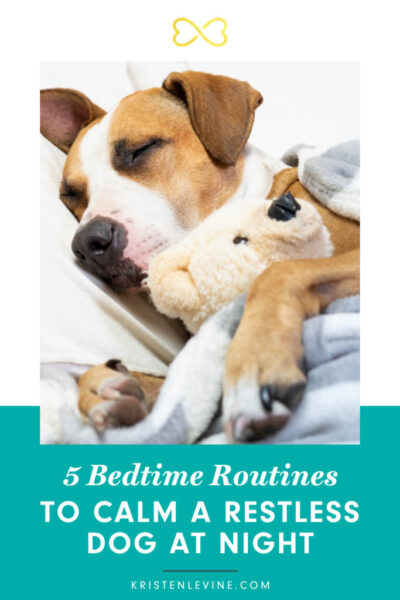
Step 5: Use Calming Scents and Sounds
Many pet parents ask, “What can I give my dog to sleep at night?” However, rather than immediately turning to medications, you might try some more natural therapies.
Some scents can have a calming effect on the human members of the family, and the same is true for our tail-wagging friends. Spraying your dog’s bed or bedtime toys with a calming blend of essential oils is a great way to alleviate any lingering anxiety from the day and get your pup ready to sleep through the night.
I love this all-natural essential oil spray from ThunderEssence, the makers of the ThunderShirt! It’s made with lavender, chamomile, and Egyptian geranium essential oils, and it smells amazing! I’m tempted to spray it on my own pillow, but for now, I’ll save it for Tulip’s bed and cuddle toys!
Your pup’s sensitive hearing may be able to pick up unfamiliar sounds or noises that you can’t. This can make them anxious or curious. Calming music, like classic music, can also help calm down a dog and get him ready for bed. I use the Zoundz app for my pets. It’s designed specifically to reduce a dog’s anxiety. I also love that every download contributes toward the Harmony Project, a program designed to alleviate anxiety in shelter pets.
FAQs
What If My Dog Is Restless at Night While I’m Crate-Training Him?
If your dog is restless while you’re crate training him at night, start by placing the crate in your bedroom so he doesn’t feel alone. Introduce the crate positively with treats and toys to make it inviting. Gradually increase the time the dog spends in the crate with the door closed during the day. When the dog is sleepy, encourage him to nap in the crate. Once he’s used to the crate during the day, he should be more comfortable at night. Check out this guide on how to crate-train anxious and senior dogs.
Should I Sleep with My Dog?
I mentioned that I sleep with Tulip, but deciding to sleep with your dog is a personal choice! Sleeping with your pup has quite a few potential benefits, such as emotional support and physical health improvements, including reduced anxiety (for both of you) and lower blood pressure. It also promotes bonding and can strengthen your immune system. However, sleeping with your pup may also disturb your sleep and make your allergies or other health issues worse.
You may want to wait until a dog is fully trained and to ensure they also have their own bed, which provides them with their own personal space. This approach can help manage any restlessness at night and maintain a good sleep environment for both you and your pet.
When to Get Help from the Professionals
Even with our best efforts, some dogs will always be more naturally prone to hyperactivity and anxiety. As pet parents, we sometimes wonder if we did something to cause our dog’s anxiety. Did we not give them enough love? Enough exposure to noises and people?
Dr. Lisa Radosta, DVM, assured me this is often not the case with most dogs who have not experienced trauma (like being surrendered to a shelter). Just like people, some dogs are simply coded to have more anxiety. It’s literally in their DNA!
You can learn more about that in this post about separation anxiety.
So, if you’ve tried the above tips and your dog is still experiencing signs, it may be time to call in your dog’s veterinarian or a behavior consultant.
I always recommend finding help through the American College of Veterinary Behaviorists. Here you can obtain contact info for a certified veterinarian who specializes in behavioral issues like anxiety. Who better to advise you on your dog’s health and behavior than a veterinarian?
With help, even the most anxious dog (and his mom or dad) can get a good night’s sleep!




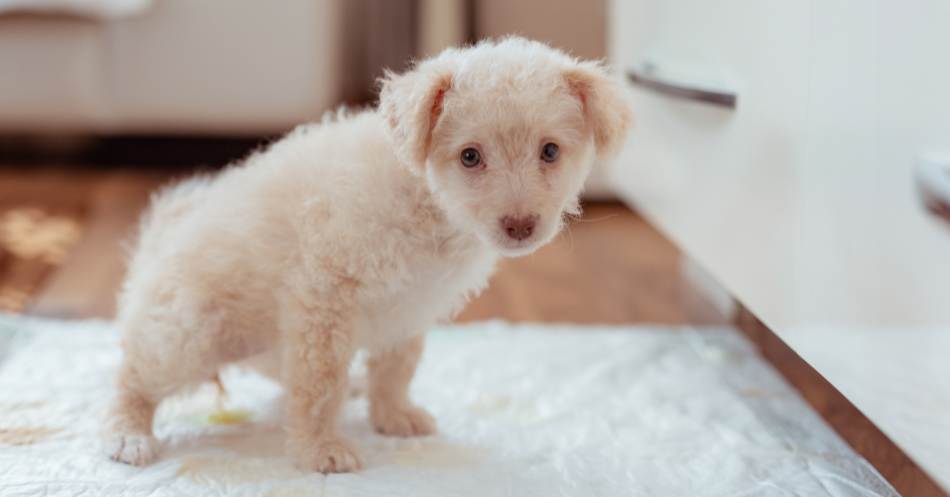

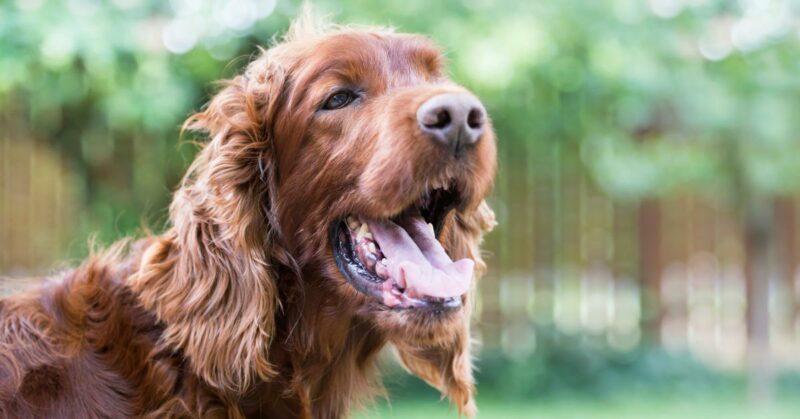
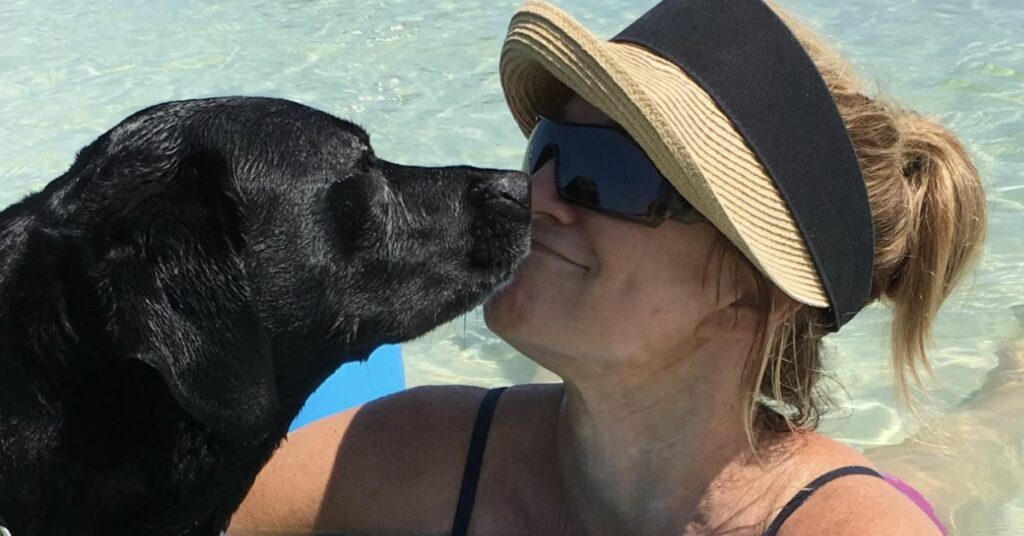
Question…we have a 4 year old Aussie who has slept in his crate since a pup, but we recently removed the crate (remodeling the bedroom) and he’s sleeping in our bed or in his doggie donut or on the floor. This began about 3 weeks ago and now he’s a lot more anxious, less willing to walk or play fetch…he seems “off”. Could it be the disruption of his crate routine is causing the change in behavior? Add to it, the kids are going back to school now in person, so his people aren’t here as much since the March quarantine.
thanks for you help – D
Hi Derek,
Yes I would say that this disruption in his routine could be a cause of this behavior. Was he ever experiencing anxiety prior to these changes? If not, that could be another indicator that the routine disruption is the cause.
I would say between the remodel and the kids returning back to school, he is trying to figure out how to adjust to this new normal. Since these changes are temporary, I would try to keep the other elements of his routine the same if you can. Meaning keep his same feeding time, walks, and playtime.
I also created an Ebook that might have some more in-depth advice for you. It is my back to work guide as many people are returning to the office since COVID hit in March, but it could easily double as a “Back to School” guide since your kids are back in the classroom! You can download it here (it’s free).
I hope this helps! Let me know
Kristen
I have a 12 year old poodle his a winny and bark all night long i gve him some treat cuddle with him and he stop, but when i put him back to his bed start doing the same thing whT should i do
Hi Edna,
Has he always done this? If not, I would take him to the vet to make sure they rule out any underlying medical condition since he is a senior pup! Does he have a daily routine? If you have a set playtime, feeding times, walking time, and bedtime he will be more likely to sleep through the night. If you don’t have a routine for him, it’s not too late to get him adjusted to one!
I make sure to exercise my dogs regularly throughout the day so they are actually tired at bedtime. That is key to getting them to sleep. Have you ever tried hemp treats? They are naturally calming and could help him to sleep better at night! I personally love these from The Anxious Pet.
Let me know if this helps! Good luck!
Kristen
My cousin has adopted an older Newfoundland dog and they seem really anxious but she wants to make sure that the bed can be more comfortable while sleeping. Getting a dog bed from a professional could be really useful and be big enough so that she fits on it comfortably. I’ll be sure to tell her about how they should be comfy and cozier in their sleeping spot that can be moved.
Glad this helped, Adam!
Kristen
Hi we have a 5 year old lhasa apso and normally he sleeps fine on his bed in my mums room but since before the 5th november he has refused to wanting to ve on my muks bed but she has chronic athritis he digs at door and ony settles onnher bed then on floor by her bed
Lynsey
Hi Lynsey,
I am sorry to hear your dog is anxious at night! Has he recently had a change in his routine? That could be the cause. Dogs thrive on routine, so if something changes, no matter how minor, it can cause some anxiety. Additionally, his arthritis could be a contributing factor. I would definitely check with your vet to determine if he could benefit from treatment!
In the meantime, I really like The Anxious Pet calming CBD solutions. I put the oil on Tulip’s food when she is extra hyper before bedtime. She gobbles it right up! My pets also both love their hemp chews! They come in peanut butter and bacon flavor. You can check them out here.
I hope this helps and he can get some relief soon! Keep me posted.
Kristen
I have a two year old xxl pitbull, he resembles a boerboel. February of 2020 he was diagnosis with seizures. I was prescribed keppra up to 5000 mg a day ( he is a big boy). He was having seizures once every other month. This past month he had 2 seizures back to back and we asked for keppra time release, he also gave my pet zonisamide to take with keppra. I am trying to explain to my vet that my dog has very bad anxiety at night time and it seems to me they think I am crazy. Our routine everyday starts off as going out to the yard and handling his business, my husband and I go to work, he is fine all day he sleeps or plays with our other pet. When we come home from work of course they go out and we all eat dinner together. When the suns goes down he becomes nervous. drooling, panting. We try to tire him out and some nights it works some nights it doesn’t. King sleeps with me for about 2 hours and than he knows to go to his bed for the rest of the night ( which is in our room ) I feel that is our time together to end our long day. There are nights he sleeps and there are nights ( a week straight) he doesn’t get sleep. He fights it and I feel he is so scared to fall asleep cause he is worried he will have another seizer. He has seen a neurologist and got many test done and everything was clear. They seen a very small spot on his brain but couldn’t confirm if that was the problem. I feel so bad for my pet and I need help and so tips on how to make some night better for us.
My dog is 9 years old and I have had her since she was 4 months old. She is an anxious dog in general but these past few nights her anxiety has been getting worse. She usually sleeps in bed with me. Once she goes to sleep she does not move, even if i go to sleep way after her she does not wait for me. The past few nights, If I am not in bed when she is ready to go to sleep, she will stare at me until i get in bed. Once I lay down, she starts to shake and request pets. She doesn’t stop clawing at my hand and trying to give me an excess of kisses until I close my eyes and am cuddling her. What does this mean and how can I reduce her bed-time anxiety?
Hi Andrea,
Have there been any changes in her routine recently? That could have caused her to have some extra bedtime anxiety. It’s best to bring this behavior up to your vet so they can rule out any underlying issues causing the behavior.
I would suggest making sure she has a clear bedtime routine. Take her outside, make sure she has been fed and has had playtime. Those things will help her to actually feel tired at bedtime. The Anxious Pet makes calming chews that are great for dogs with anxiety! My dogs love them. You can get them here.
I hope this helps! Good luck and I hope your pup feels better soon!
Kristen
Thank you for sharing your post about 5 Bedtime Routines to Calm an Anxious Dog. Thanks for the great tips and suggestions. I learned something. Nice photos also. I will bookmark this site.
Hi Richard,
Thanks for sharing! I am glad you found this helpful!
Kristen
We have a 3 year old terrier mix that we adopted about a week ago. Aside from his separation anxiety, he’s an angel dog during the day. After our hour plus walks in the morning, he sleeps and rests most of the day. We take him out 3-4 more times for shorter walks and potty breaks and generally he gets about 2.5 hours of walking time in total. He seems a bit uninterested in play time but we try to get some of that in as well. But then around 6 pm he turns into a different dog, won’t let us eat dinner without barking constantly and begging and is generally extremely agitated for about an hour. We take him into the bedroom and have to hold him to calm him down. The rest of the night is usually smooth after that with him resting and then easily sleeping (trying to crate train but he’s stubborn so he’s been sleeping on our bed). I’m wondering if you have any recommendations for how to calm him during this time.
Hello! We adopted our dog about 7 months ago, and she is just now about to turn 1. When we first got her we had no problems getting her to sleep through the night. No matter what we did throughout the day she would start to settle around 7pm in her crate and wake up around 4am for a quick potty break, then sleep on the ground next to the couch until 6.
In the past 3-4 months she’s been getting worse with sleeping. Roughly 1-2 times a week she’ll wake up in the middle of the night whimpering. At first we thought it was potty related, and it was hit or miss of whether or not she actually needed to. But always after taking her out she would run over by the couch and try to sleep on the ground instead of her crate. The first few nights we allowed it, but then realized it was creating a bad pattern. We did some research and felt it was separation anxiety. My husband is retired and home with her all day.
Since realizing this, we have tried keeping her in the crate and occasionally acknowledging her to know we are close by, but she’ll whimper throughout the night. We just want a full nights rest, and don’t really want her in the bed. We would love some suggestions. Thank you!
Thank you for the really helpful tips.
We have a 9-week old west highland terrier called Hugo. We find that when he cries in the night for what we think is a trip outside to the toilet – he has already done his business in the pen without making a sound.
Any helpful thoughts would be most welcome.
All the best,
Adam
Hi Adam,
Congrats on your new puppy! Potty training takes time, and it can definitely pose a challenge when he is going while you’re asleep. Consistency is huge when house breaking puppies. This means that he should have a predictable meal time, play time, walk time, and even a predictable place to go potty. When you take him outside to potty, take him on a leash and go to the same spot each time. That way, he can associate that place with where he needs to potty.
Additionally, ensure you are taking him out enough! For puppies that are 8-12 weeks old or dogs under 8 lbs, take a trip outside about once per hour. He should also go out after waking up, before going to bed, and right after eating.
Once it is time, getting him neutered will help him be less likely to mark his territory, too.
I hope this helps! Keep me posted.
Kristen
My boyfriend & I rescued a puppy from a shelter at 10 wks old. From day one he has expressed signs of separation anxiety. We have tried multiple tactics but still almost 2 years later he still whines & barks when we put him in his crate and leave. (he sleeps in his crate at night without incident, which was not the case for the first year so we are making progress) He is not so bad when we leave separately but when we leave together it seems to ramp up his whining, scratching at the crate, & barking. Any suggestions? (We have tried just leaving for 10 mins at a time on multiple occasions but he is still freaking out when we get back)
Hi Cindy,
I am so sorry your dog has separation anxiety. This issue isn’t uncommon in dogs, and it is heartbreaking!
Have you ever tried Adaptil diffusers? They release calming pheromones, or “happy messages” into the air. They are odorless to humans, but can really help to keep him calm. You can put one in the room where his crate is. Additionally, I really like Zylkene. It is a anti-anxiety supplement made from dehydrated milk. You can sprinkle this over food, into a treat, or in his mouth before you leave the house to help him to feel more at ease.
I would also recommend talking to your vet if the issue persists. If his anxiety is severe, he could benefit from medication.
Hope this helps!
Kristen